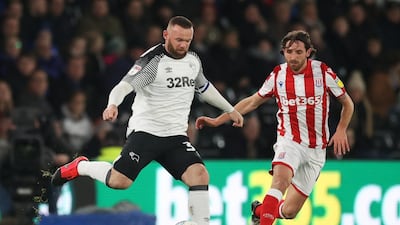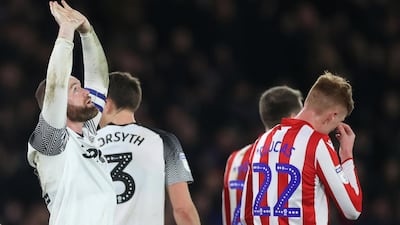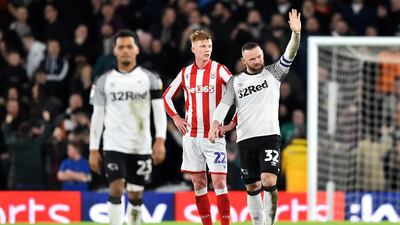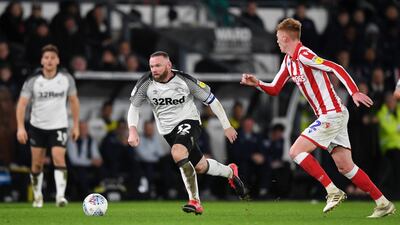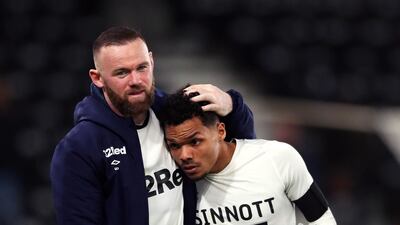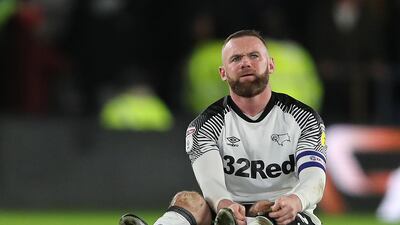Wayne Rooney covers his mouth to talk to striker Martin Waghorn ahead of a 66th minute Derby County free-kick against Stoke City.
Rooney’s team are leading 2-0 in his seventh game for his new club and it appears that, having studied the opposition’s six man wall, he’s offering advice to Waghorn about where to put the ball.
That’s not the plan. As Waghorn shapes to take the kick, Rooney quickly moves forward and curls a shot over and around the wall into the top right-hand corner of Jack Buckland’s net for the 361st senior goal of his career.
“I saw my mate the other day, He said to me he saw the white Pele,” sing the Derby fans. “So I asked, who is he? He goes by the name of Wayne Rooney, Wayne Rooney, Wayne Rooney, He goes by the name of Wayne Rooney...”
The 34-year-old, now playing as a holding midfielder like his manager Philip Cocu did so well for Holland and Barcelona, is the game’s central figure. The electric pace has long gone, but the vision and passing is peerless in England’s second tier.
Captain Rooney is calm in possession, he anticipates what’s coming next. If this was American football he’d be a quarter-back, launching the ball forward with vision, speed and accuracy.
He does what great players do, making everything look simple. Seven minutes later, Rooney receives the ball on the halfway line with his back to goal three opponents around him. After three neat touches to turn and create space, he passes forward ahead of Jayden Bogle, who smashes the ball in to make it 4-0 and Derby’s best win and performance of the season.
It has not been a good season for Derby, based in England’s 29th biggest city with a population of around 275,000.
The club went all out to achieve promotion back to the Premier League for the first time since 2008 last season, bringing in Frank Lampard as manager. His young team, with Mason Mount, Harry Wilson and Fikayo Tomori were good enough to knock Jose Mourinho’s Manchester United out of the League Cup at Old Trafford.
Lampard was considered one of the players and popular among fans, but his team went for broke for the prize of £170 million (Dh816m) Premier League riches – and broke when they lost to Aston Villa in the play off final.
Derby have since been fined for breaking the league’s financial rules after owner and chairman Mel Morris used a separate company to purchase their Pride Park home for £80m, then lease it back to the club.
The stadium had been valued at £40m, but the sale allowed Derby to make a profit of £14.6m for 2017-18.
Without the ground sale, Derby would have been in breach anyway after three years operating at a loss and rival clubs were furious. Birmingham City were deducted nine points after a similar breach last season. Derby’s fate is yet to be decided.
Star appeal
Such has been the story of Derby’s season, one which has seen their club captain Richard Keogh sacked for gross misconduct over his involvement in an October car crash that also saw his team mates Mason Bennett and Tom Lawrence arrested.
Rooney – signed in August on an 18 month contract on the understanding that he could play in January after completing a successful spell playing for DC United in the MLS – walked into a club as player-coach closer to the relegation zone than the top of the table.
He was bought because of his star appeal but also to use his experience and considerable influence in a dressing room badly needing it.
For Rooney himself, the idea of helping Derby back into the Premier League appealed, as did the proximity to his family home across the Derbyshire border in Cheshire.
Rooney did offer his services to his former club Manchester United first, but more in hope than expectation. If Rooney’s new side can overcome fourth-tier Northampton Town in an FA Cup replay on Tuesday then it will set up a home game against United.
Derby may be in flux, a long way off where they want to be, but are a big club with a fine history which is proudly displayed on black and white photos around the stadium.
The management team of Brian Clough and Peter Taylor are pictured after leading to Derby to the league title in 1972, and there there are images of the Rams beating mighty Real Madrid 4-1 in the European Cup in 1975.
Current average home crowds of 27,000 are still higher than five Premier League teams. They’re the third best supported team in the Championship this season behind Leeds United and arch-rivals Nottingham Forest. None have the benefit of parachute payments from England’s top-flight.
Though surrounded by beautiful countryside, it does not receive a single mention in the 1000 page Rough Guide to Great Britain. The 1863 Bradshaw's handbook described Derby as "the place where the first silk mill was built in England" and praises the "handsome town hall and clock tower."
Derby is a compact, proud city as evidenced seven minutes to kick off when a rousing poem is pumped out of the public address system extolling its virtues.
“We Are Derby,” it goes. “Rail-track city; birthplace of the industrial revolution.
"Where inventors span cogs to engineer solutions. We're a city that delivers.
"From Royal Mail PO boxes. To Royal Crown Derby china.
"Craft and specialism's our definer. We Are Derby.
"Bearers of Joseph Strutt's philanthropy. Erasmus Darwin's philosophy
"Where Florence Nightingale hatched plans. To revolutionise the healthcare of England.
“We're engineers with dirty fingernails. Graft and sweat pump through our veins. We're Rolls-Royce engines, Belper nails. Toyota motors, Bombardier trains.”
And it goes on, reminding everyone that “The underdog city of Middle England” has much to celebrate.
The sabre rattling tone is only broken when the poem is following by a public appeal for the owner of a white Citreon to return to their car immediately.
Fellow Midlands opponents Stoke have fallen even harder. Relegated in 2018 after a decade in the Premier League, they were favourites for an immediate return last season. Stoke finished 16th.
It’s even worse this term with the team 20th in the Championship and fighting relegation with an abysmal record in the cups.
Stoke have been knocked out at the first stage in seven of their last eight cup competitions. Despite their lowly position, optimism has improved under new manager Michael O’Neill and they sell all 3,200 tickets for the 34-mile trip down the A50.
The tickets, priced at £33, are more than any Premier League fans will pay for an away game this season.
It does help that their club provide free coach travel for away games, which is useful since the game has been re-arranged by television to be on Friday night – meaning it’s too late to get a train back to Stoke. Derby may make trains but public transport outside London is abysmal at night.
There’s a rivalry between the clubs, but it’s neither are each other’s main rivals.
"Port Vale is our derby game, while Derby's main rivalry is with Nottingham Forest," explains Anthony Bunn, who edits the Stoke fanzine Duck. He also points out that Stoke's current decline was not unexpected.
Influence is everywhere
“Stoke fans could see our relegation coming from the Premier League and none of us expected to come straight back up, even though we had the most expensive team assembled in the Championship.”
Stoke are well funded by Bet365, whose head Denise Coates is the highest paid executive (and tax payer) in Britain last year.
“Nathan Jones, our manager last year, said all the right things about playing attacking football with young players and we all really wanted him to do well, but that wasn’t the football we saw and Jones was so emotional in victory or defeat that I worried about him,” said Bunn.
O’Neill is more mature and experienced. He doesn’t get carried away. Including caretaker managers, Stoke are on their sixth since Mark Hughes left after 200 games in 2018.
The Stoke fans create a din and songs include “Who put Rooney on the kitchen floor? Super Phillip Bardsley” a reminder of a boxing match the former Stoke player and close friend of Rooney once had with him in Rooney’s kitchen.
They boo Rooney, the pantomime villain for the night – but the former England captain responds by dominating the match. He takes free-kicks, his influence is everywhere.
Derby fans sing for Cocu to give them a wave. The dispassionate Dutchman does not. But he has reason to be happier with Rooney in his team who’ve won four, drawn two and lost only one of the seven games he’s participated in.
Their poor form away from home has proved costly. The club if obviously in transition – but what will happen if they’re fined for breaching financial rules?
Rooney, Manchester United’s all-time top goalscorer and holder of a record 120 England caps and 53 goals for his country, is substituted with ten minutes to play, his work done.
As he passes on his captain’s armband he receives an ovation from fans singing his name. It’s a successful night but it’s a sideshow compared to what he’s used to.
Neither of Britain’s best selling broadsheets or tabloid newspapers carry anything from the game the following day beyond the result. But even ‘Rooney 67’ by the scoreline brings a smile to those who have watched him for so long and can enjoy the tactical mastery he has developed in maturity.
